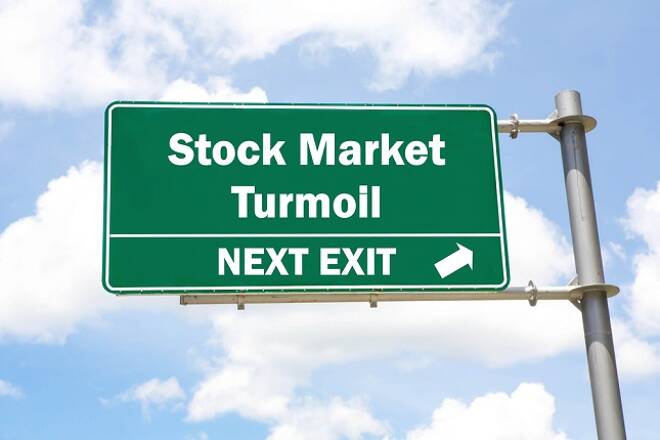Advertisement
Advertisement
U.S. Stocks Tumble on Fear Economy is Poised to Weaken
By:
Concerns over a possible economic slowdown exerted the most pressure on the markets. Stocks started to weaken on Monday after the yield on the three-year Treasury note surpassed its five-year counterpart. When short-term yields trade above long-term yields, or invert, a recession could follow, however, it is often years away after the signal triggers. Furthermore, it has to be confirmed by two-consecutive contractions in GDP. Basically, the “inversion” is saying that the economy is poised to weaken.
The major U.S. stock indexes plunged on Tuesday, posting their biggest declines since October, as investors took profits following Monday’s sharp rise. The catalysts behind the massive shedding of risky assets are concerns over a possible economic slowdown and worries around U.S.-China trade which added to Wall Street jitters.
In the cash market, the benchmark S&P 500 Index settled at 2,700.06, down 3.2 percent. The blue chip Dow Jones Industrial Average fell 799.36 points to close at 25,027.07, down 3.1 percent and the tech-driven NASDAQ Composite settled at 7,158.43, down 3.8 percent.
Trading volume in U.S. stocks was higher than usual on Wall Street. Algorithmic traders stepped up their activity once the S&P 500 Index fell below its 200-day moving average.
As far as the sectors are concerned, the financials received the brunt of the selling, plunging 4.4 percent. However, the interest sensitive utility stock sector was the only positive in the benchmark index, rising 0.16 percent.
Concerns over a possible economic slowdown exerted the most pressure on the markets. Stocks started to weaken on Monday after the yield on the three-year Treasury note surpassed its five-year counterpart. When short-term yields trade above long-term yields, or invert, a recession could follow, however, it is often years away after the signal triggers. Furthermore, it has to be confirmed by two-consecutive contractions in GDP. Basically, the “inversion” is saying that the economy is poised to weaken.
Financial Stocks Affected the Most
The flattening yield curve has put the fear in bank stock investors because an inversion may hurt their lending margins. On Tuesday, the SPDR S&P Bank ETF (KBE) dropped 5.3 percent. Shares of J.P. Morgan Chase, Citigroup and Bank of America all weakened by more than 4 percent. Citigroup and Morgan Stanley both reached 52-week lows along with Regionals Financial, Citizens Financial and Capital One.
The SPDR Regional Banking ETF dropped 5.5 percent and closed 20 percent below its 52-week high. It also posted its worst day since March 2017.
What’s Up With the Trade War Truce?
Investors initially cheered the news from over the weekend that the U.S. and China agreed to hold off on any additional tariffs on each other’s goods on January 1, in order to allow trade talks to continue. However, discrepancies over when the truce would begin has led to confusion. While President Trump’s economic advisor, Larry Kudlow, told reporters Monday that the cease-fire would start from January 1, the White House later issued a corrected statement saying that the 90-day truce period would start on December 1.
Trading Volume Up Ahead of Stock Market Closure
Trading volume rose sharply on Tuesday, increasing more than 159 million shares of the SPDR S&P 500 ETF trust (SPY) exchanged hands. The SPY’s 30-day volume average is 110.5 million. The jump in volume comes as the U.S. stock market will be closed on Wednesday out of respect for former President George H.W. Bush’s funeral.
About the Author
James Hyerczykauthor
James Hyerczyk is a U.S. based seasoned technical analyst and educator with over 40 years of experience in market analysis and trading, specializing in chart patterns and price movement. He is the author of two books on technical analysis and has a background in both futures and stock markets.
Advertisement
